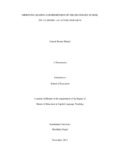
Please use this identifier to cite or link to this item:
https://hdl.handle.net/20.500.14301/260| Title: | IMPROVING READING COMPREHENSION OF THE SECONDARY SCHOOL EFL LEARNERS: AN ACTION RESEARCH |
| Authors: | Khanal, Ganesh Kumar |
| Citation: | Khanal.G.(2013)Improving reading comprehension of the secondary school EFL learners: An action research |
| Issue Date: | Nov-2013 |
| School: | SOED |
| Department: | DOLE |
| Level: | Masters |
| Program: | Master of Education in ELT (2 years) |
| Abstract: | Among the multiple ways of learning, reading is inevitable. It plays a vital role to determine the individual’s knowledge. Generally, everyone who can read the written form of the language is considered as a literate person. Besides, person’s knowledge is judged on his/her proficiency in reading. Reading is inevitable for the human beings not only to increase the knowledge they have but also to fulfill their daily needs. The needs of reading may vary based on the context, but there is no doubt about the importance of reading. In other words, everyday, one has to read course books, letters, sing boards, medical reports, bills and many other different text messages. In this process, the reader requires to understand the reading materials and respond them in an appropriate way. Tickoo (2003) argues, “Reading is not, as many still believe, a passive activity in which readers just move their eyes over the printed page in a linear order. It is interactive in that in it the reader brings his personal knowledge (or schema) to the text in front of him” (p. 22). The readers process the text, make associations of the content knowledge with their prior understanding, and react according to the necessities. Similarly, Wallace (1992) states that the readers are seen as negotiating meaning as meaning is partial within the text and writers’ intentions may not be privileged over readers’ interpretations. He further argues that reading is concerned with the ability to decode words and with the particular skills judged prerequisite to fluent, independent reading. In this sense, the learners are required to comprehend the text message in sufficient way, which can only make the difference in his/her learning. The same case applies in the reading of English as a foreign language. However, the classroom context in the public schools does not seem to be supportive to the learners to learn variety of reading materials. As a result, the learners, even in the secondary level, fail to deal and comprehend the texts, which causes their failure in English subject. Moreover, the poor comprehension of the learners leads them towards frustration in learning the English language. In this regard, I focused my research on the strategy that helped the secondary EFL learners to learn the reading materials on their own in the classroom. Keeping the learners' real problems in mind, I made my plan for improving the comprehension of the students. The intervention plan was exploited through the action research process under the qualitative research method. The intensive review of the literature helped me to design the classroom activities and implement them making the learners more responsible in the learning process. The philosophical considerations guided my action research whereas the quality standards maintained the reliability issues regarding the study. The effort done for the action research had a very significant result as it provided the learners with better opportunity to learn playing with the comprehension related tasks along with their friends. In addition, it has also been significant to develop my professional skills as an English teacher. The action research provided me the avenue to learn the Nepalese EFL setting. It is equally valuable for shaping my classroom practices concerning teaching English. |
| URI: | https://hdl.handle.net/20.500.14301/260 |
| Appears in Collections: | Disertation |
Files in This Item:
| File | Description | Size | Format | |
|---|---|---|---|---|
| Ganesh Final Print MY THESIS PRINTING TODAY (Repaired) - Copy.pdf | 2.92 MB | Adobe PDF |  View/Open |
Items in DSpace are protected by copyright, with all rights reserved, unless otherwise indicated.